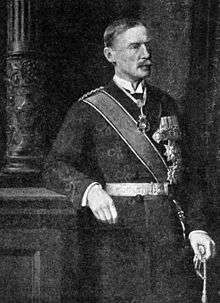Declaration to the Seven

The Declaration to the Seven was a document written by the British diplomat Sir Henry McMahon and released[1] on June 16, 1918[2] in response to a memorandum issued anonymously by seven Syrian notables in Cairo who were members of the newly formed Party of Syrian Unity, established in the wake of the Balfour Declaration and the November 23, 1917 publication by the Bolsheviks of the secret May 1916 Sykes-Picot Agreement between Britain and France.[3] The memorandum requested a "guarantee of the ultimate independence of Arabia". The Declaration stated the British policy that the future government of the regions of the Ottoman Empire occupied by Allies of World War I should be based on the consent of the governed.[4]
Significance of the Declaration
The Declaration to the Seven is notable as the first British pronouncement to the Arabs advancing the principle of national self-determination.[5] Although the British sought to secure their position by adopting the Wilsonian doctrine of Woodrow Wilson, neither Britain nor France was prepared to implement their promises to the Arabs nor to abdicate the position won by victory over the Ottoman Empire.[6]
The document was not widely publicised, the Declaration may explain the action of General Edmund Allenby, who ordered a halt to the advance after the rout of Turkish forces outside Damascus and allowed the city to be captured by Arab forces in September 1918 after the Battle of Megiddo and acting on instructions from London, thus bolstering the Arab claim to the independence of Syria whilst simultaneously undermining the French claims to the territory under the terms of the Sykes–Picot Agreement.[5]
The Seven
- Rafiq al-Azm;
- Sheikh Kamal al-Qassab;
- Mukhtar al-Sulh;
- Abd al-Rahman Shahbandar;
- Khaled al-Hakim;
- Fauzi al-Bakri;
- Hasan Himadeh.
See also
References
- ↑ "Report of a Committee set up to consider certain correspondence between Sir Henry McMahon (his Majesty's high commissioner in Egypt) and the Sharif of Mecca in 1915 and 1916". His Majesty's Stationery Office. 1939-03-16. Archived from the original on 2008-06-18. Retrieved 2008-07-18.
- ↑ The British Government's Declaration to the Seven Arabs Pubished by the Arab Culture Trust
- ↑ Choueiri, Youssef M. (2000). Arab nationalism, a history: nation and state in the Arab world. Cambridge, Massachusetts: Blackwell Pub. p. 149. ISBN 0-631-21729-0.
- ↑ Friedman, Isaiah (2000). Palestine: A Twice-Promised Land? Vol. 1: The British, the Arabs, and Zionism, 1915-1920. New Brunswick, N.J., U.S.A: Transaction Publishers. pp. 195–197. ISBN 1-56000-391-X.
- 1 2 Paris, Timothy J. (2003). Britain, the Hashemites, and Arab Rule, 1920-1925: the Sherifian solution. London: Frank Cass. p. 50. ISBN 0-7146-5451-5.
- ↑ Holt, P. M.; Ann Katherine Swynford Lambton; Bernard Lewis (1977). The Cambridge history of Islam. Cambridge, Eng: University Press. p. 392. ISBN 0-521-29135-6.
